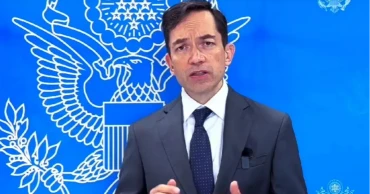visa restriction policy
What could be the possible reasons to apply US visa restrictions against someone?
The United States has said its visa restriction policy can be applied to anyone "found to be undermining" democratic elections in Bangladesh.
“This could include vote rigging, intimidating voters, use of violence to prevent people from exercising their rights to freedom of association and freedom of peaceful assembly, and the use of measures designed to prevent political parties, voters, civil society, or the media from participating in the electoral process or expressing their views,” US Embassy Spokesperson Bryan Schiller told UNB while responding to a question.
Read: US Sen. Bob Menendez charged with corruption-related offenses for the second time in 10 years
He came up with the remark when asked whether journalists may also come under visa restrictions.
Clarifying the issue further, the US Embassy in Facebook post said, “We are applying the [visa restriction] policy in a balanced way against anyone [undermining the democratic election process in Bangladesh] - regardless of being pro-government, opposition party, members of law enforcement agencies, members of the judiciary, or media persons.”
The embassy spokesperson said the US Department of State relies on extensive, well-resourced, and fact-checked case-by-case review of credible information about those undermining the democratic process in Bangladesh to determine whether to apply visa restrictions.
Read: Haas raises eyebrows by saying members of media may face visa restrictions
US announces in-person interview waivers for certain visa applicants throughout 2023
The United States has said it will not release the names or numbers of people in Bangladesh subjected to the visa restrictions.
"Visa records are confidential under US law," US Embassy Spokesperson Bryan Schiller told UNB earlier.
But, he said, the US government has looked very closely at incidents since they announced this policy.
"After a careful review of the evidence, we have imposed visa restrictions on members of law enforcement, the ruling party, and the political opposition,” said Bryan Schiller.
Read: 'Smart Bangladesh' needs to harness full potential of women
In May this year, US Secretary of State Antony Blinken announced the new visa policy under Section 212(a)(3)(C) (“3C”) of the Immigration and Nationality Act to support Bangladesh’s goal of holding free, fair, and peaceful national elections.
Under this policy, the United States will restrict the issuance of visas for any Bangladeshi individual, believed to be responsible for, or complicit in, undermining the democratic election process in Bangladesh.
The United States notified the Bangladesh government of this decision on May 3, 2023.
The Department of State on Friday said they are taking steps to impose visa restrictions on Bangladeshi individuals responsible for, or complicit in, undermining the democratic election process in Bangladesh.
Read: European Film Festival presents a true cultural collaboration between Bangladesh, EU: Dutch Ambassador
"Our actions today reflect the continued commitment of the United States to supporting Bangladesh’s goal of peacefully holding free and fair national elections, and to support those seeking to advance democracy globally," said its Spokesperson Matthew Miller in a statement.
These individuals include members of law enforcement, the ruling party, and the political opposition, he said.
"The United States is committed to supporting free and fair elections in Bangladesh that are carried out in a peaceful manner," Miller said.
These persons and members of their immediate family may be found ineligible for entry into the United States.
Additional persons found to have been responsible for, or complicit in, undermining the democratic election process in Bangladesh may also be found ineligible for US visas under this policy in the future, according to the US Department of State.
This includes current and former Bangladeshi officials, members of opposition and ruling political parties, and members of law enforcement, the judiciary, and security services, Miller said.
2 years ago

